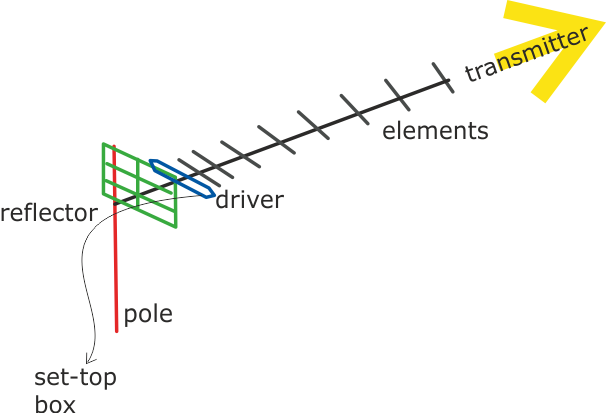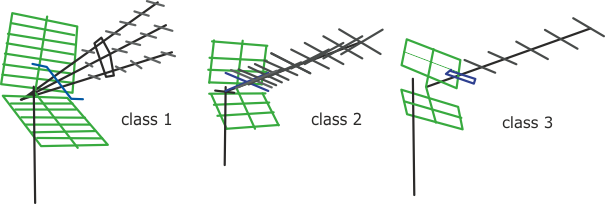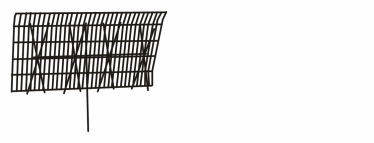Freeview reception - all about aerials
 Brian Butterworth published on UK Free TV
Brian Butterworth published on UK Free TV Updated 8th January 2014.
Your ability of receive all the Freeview transmissions depends on the suitability of aerial
- the design style,
- the "group", and
- its physical location.
Standard type - Yagi aerial

The standard type of TV aerial is known as the Yagi aerial. It is mounted on a pole, and consists of a rod with a reflector (shown green) at the back and many spiky elements (in grey) at the front. The connecting cable connects to the element nearest the reflector, known as the driver (shown in blue).
These Yagi aerials are directional and so pick up signals best from a transmitter that the rod points towards. The more elements the aerial has, the better it picks up a signal and becomes more directional.
A standard-type aerial is all that is required for digital TV reception in most places. These antennae have between 10 and 18 elements and a single reflector. These are recommended for new installations for good digital television reception, but will more often than not function perfectly in good reception areas.
Typically these aerials are designed to receive only some transmission frequencies - see "groups" below.
High Gain aerials

These aerials are designed for poor digital reception areas, and have two reflectors. For maximum signal strength, some digital high gain aerials have up to 100 elements. Since the switchover to digital-only transmissions back in October 2012, most UK households now have good quality digital TV signals.
A more expensive aerial is only required where the signal strength is low, but can often provide the whole Freeview reception where it might otherwise be impossible.
The CAI (that represents aerial installers) has four standards for digital TV aerials. The highest standard "1" is for homes on the fringes of coverage areas, intermediate standard "2" is suitable for use within the coverage area; minimum standard "3" is for good coverage conditions.
These aerials can be either wideband, or receive only selected frequencies - see "groups" below.
Grid

You may haved used a 'Grid aerial' for analogue reception, but as they are generally unsuitable for Freeview reception, they have now generally been replaced by the Yagi type. However in some places a Grid aerial installation may work for Freeview: otherwise replace with a standard Yagi aerial.
Indoor
Indoor aerials are generally not suitable for Freeview reception. In areas of good signal strength it is often possible to receive some transmissions. Even where an aerial works, people often find that may get interruptions to their viewing (or recording).Loft mounted
Loft mounted arrivals are not generally recommended for Freeview reception, as the roof tiles and plumbing will degrade the signal. Some compensation for this loss of signal can be made by using satellite-grade cable to connect the set top box to the aerial.Positioning
The best position for a TV aerial is mounted outdoors, as high from the ground as possible, pointing directly at the transmitter. The signal can be blocked by hills and tall buildings. It should be positioned away from any other aerials.Horizontal or vertical?
The transmitter will either use vertical mode which requires the elements of your aerial to be up-down, or horizontal mode which requires them to be level with the ground.Groups
Both analogue and digital television is transmitted the same group of transmission frequencies (known as channel 21 through to 60). A coloured marking on the aerial shows the group.
To create the best possible analogue picture, TV transmissions from adjacent transmitters have been designated to several different groups of frequencies. By using an aerial that receives only the channels in the correct group, the analogue picture can be kept free from interference.
To receive Freeview transmissions from the same transmitter it has been sometimes necessary to use frequencies that are not part of the transmitter's normal group. When this has occurred, the aerial will need to be replaced with a "wideband" aerial (also known as group W) - one that covers every group.
As Ofcom is planning to move the TV frequencies again - perhaps as soon as 2018 - it may be wise to use a wideband aerial if you can to ensure you can keep viewing Freeview for many years to come.
Help with Television sets?
Sunday, 17 April 2011
K
KMJ,Derby2:44 PM
Michael O'Pray: If BBC1/2/3 have poor reception but BBC4 is ok it suggests that you are not receiving these signals from Sandy Heath, but from a transmitter still radiating Mux1 and MuxB (possibly Waltham). Check the channel list for duplicates in the 800's which may give better reception. Is it possible to see a channel or frequency listed against the program you are watching or when scanning? This will identify the transmitter you are tuned to.
| link to this comment |
K
KMJ,Derby3:07 PM
John: whilst some receivers do store the strongest set of channels it is more likely that Sandy Heath was stored because it appears first in the scan.Any subsequent options which show a variation are stored in the 800s on most tuners.Note: some tuners ask which region you wish to store, a few even put the last set of channels found in the normal slots and displace those found earlier to the 800s or random vacant slots!
| link to this comment |
M
Michael O'Pray 6:04 PM
Daventry
Thanks all I used the CH button on the remote instead of numbers 1-9 and eventually as you have said found BBC 1&2 in the 800s and the reception was fine. I assume that once it starts tonight BBC3-4 will also be OK
I went full circle with the CH +&- and noticed that there are still some channels that are unwatchable. Most don't matter to me but Film 4 was also unwatchable which is a pity.
Any ideas as to what I do about this?
While I thought I had retuned according to DigitalUK's instructions after 13 Apr, I was using instructions that are several weeks old.
I'll check again and re-do the re-tune to make sure that is right.
In the meantime I'd appreciate anyone with ideas as to how I get Film4 OK responding
Thanks
| link to this comment |
Michael's: mapM's Freeview map terrainM's terrain plot wavesM's frequency data M's Freeview Detailed Coverage
M
Michael O'Pray11:14 PM
Daventry
As of 11:10pm on Sunday I now have an improvement in every channel- literally. Channels such as Film4 ITV4 and the others such as Russia today are all watchable. These weren't just fragmenting slightly or freezing occasionally before, they were literally impossible to watch.
So what explains the improvement and will it last or is this just a late night phenomenon and if so why do things get better late in the evening?
Thanks
Thanks
| link to this comment |
Michael's: mapM's Freeview map terrainM's terrain plot wavesM's frequency data M's Freeview Detailed Coverage
Monday, 18 April 2011
J
John7:01 AM
Aylesbury
KMJ. Thanks for that. You are right and I've now found my Oxford channels in the 800's of the guide. I have a Humax PVR so I deleted all channels then manually re-tuned for just the Oxford channels and all is normal again.
Doing it that way kept the EPG to a manageable length and less confusing.
Thanks again
| link to this comment |
John's: mapJ's Freeview map terrainJ's terrain plot wavesJ's frequency data J's Freeview Detailed Coverage
John/Michael O'Pray: More at Digital Region Overlap | ukfree.tv - independent free digital TV advice .
| link to this comment |
N
Norma Hargreaves9:28 AM
Cramlington
I have just had a new Digital Aerial fitted as it was suggested to me due to fragmenting on some channels. As the fragmenting (picture break up) is still happening our aerial fitter chap has said he will point the aerial to the Scottish transmitter to aleviate the problem, is this OK? (everyone el;ses Aerial in our street points to the south)
My post code is NE23 3QW
| link to this comment |
Norma's: mapN's Freeview map terrainN's terrain plot wavesN's frequency data N's Freeview Detailed Coverage
Norma Hargreaves: You are not in range of any Scottish transmitters.
Your aerial should point South-Southwest (204°) at the Pontop Pike transmitter.
You might want to check the Freeview intermittent interference | ukfree.tv - independent free digital TV advice page before making any changes.
| link to this comment |
N
Norma Hargreaves2:27 PM
Thank you for this, I shall let the Aerial Chap know when he comes around this afternoon
Regards
| link to this comment |
M
Michael O'Pray2:29 PM
Daventry
I am learning more each day and thanks for the link. Film4 and ITV4 have today at noon reverted to being unwatchable as have the minority channels such as Russia Today.
It may be that I am thick but I couldn't see anything in the link that explains good reception at 11:00pm and unwatchable the next day at noon.
Am I stuck with occasionally getting good reception for Film4 and ITV 4 late at night?
I have also discovered that there is a relay transmitter at Dallington Park Northampton which is only 12 miles away so I'd assume good reception on all channels.
Thanks
| link to this comment |
Michael's: mapM's Freeview map terrainM's terrain plot wavesM's frequency data M's Freeview Detailed Coverage
Select more comments
Your comment please